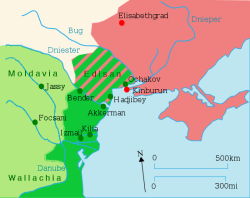Treaty of Jassy
 The region ceded to Russia (striped) | |
| Type | Peace treaty |
|---|---|
| Signed | 9 January 1792 (Gregorian cal.); 29 December 1791 (Julian cal.). |
| Location | Jassy, Moldavia |
| Signatories | |
| Languages | Russian, Ottoman Turkish |
The Treaty of Jassy, signed at Jassy (Iași) in Moldavia (presently in Romania), was a pact between the Russian and Ottoman Empires ending the Russo-Turkish War of 1787–92[1] and confirming Russia's increasing dominance in the Black Sea.[2]
The treaty was signed on 9 January 1792 (O.S.: 29 December 1791) by Grand Vizier Koca Yusuf Pasha and Prince Bezborodko (who had succeeded Prince Potemkin as the head of the Russian delegation when Potemkin died). The Treaty of Jassy formally recognized the Russian Empire's annexation of the Crimean Khanate via the Treaty of Küçük Kaynarca of 1774[3] and transferred Yedisan (the territory between Dniester and Bug rivers) to Russia making the Dniester the Russo-Turkish frontier in Europe, and leaving the Asiatic frontier (Kuban River) unchanged.[4]
The signing of peace was strongly influenced by the storming of the Ottoman fortress of Izmail by commander Alexander Vasilyevich Suvorov-Rymniksky.[5]
See also[edit]
References[edit]
- ^ Chisholm, Hugh, ed. (1911). . Encyclopædia Britannica. Vol. 15 (11th ed.). Cambridge University Press. p. 279.
- ^ Hitchens, Keith (2012). "Great Powers, Small Powers: Wallachia and Georgia Confront the Eastern Question, 1768–1802". In Ivan Biliarsky; Ovidiu Cristea; Anca Oroveanu (eds.). The Balkans and Caucasus: Parallel Processes on the Opposite Sides of the Black Sea. Cambridge Scholars Publishing. p. 20. ISBN 978-1-4438-3705-7.
- ^ "Russia and Turkey signed the Treaty of Jassy". Presidential Library of Russia. 2009. Retrieved 19 May 2016.
- ^ Gibb, Elias John Wilkinson (1911). . In Chisholm, Hugh (ed.). Encyclopædia Britannica. Vol. 27 (11th ed.). Cambridge University Press. p. 454.
- ^ See Result
